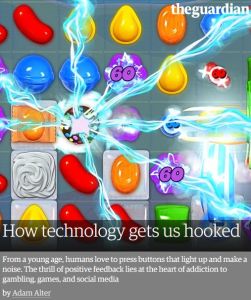Join getAbstract to access the summary!

Join getAbstract to access the summary!
Adam Alter
How Technology Gets Us Hooked
From a young age, humans love to press buttons that light up and make a noise. The thrill of positive feedback lies at the heart of addiction to gambling, games, and social media
The Guardian, 2017
What's inside?
Tech companies use a nifty bag of tricks to get and keep you addicted to their products.
Recommendation
Why does the little like button below your latest Facebook post make you keep checking your profile? Because you never know how many likes you’ll get. Unpredictable feedback motivates people, says Adam Alter, a professor of psychology and marketing at New York University. He explains that as opposed to substance addictions, behavioral addictions hijack human traits that are in and of themselves desirable, such as the drive to improve and to grow. However, addictive technologies may employ these traits toward destructive ends, such as getting you to spend long hours playing video games or waste money on slot machines. getAbstract recommends Alter’s essay on the psychology behind addictive technologies to educators, social activists and any one tempted to check their Facebook feed before reading on.
Summary
About the Author
Adam Alter is an associate professor of marketing and psychology at New York University’s Stern School of Business and the author of Irresistible: The Rise of Addictive Technology and the Business of Keeping Us Hooked.






















Comment on this summary